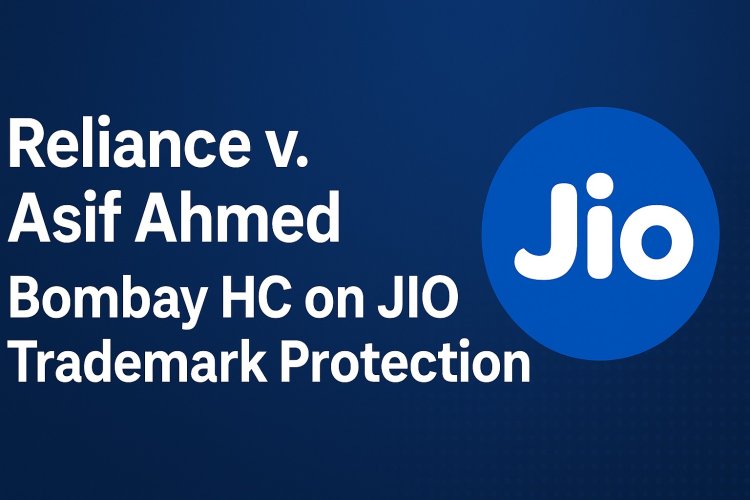Reliance v. Asif Ahmed: Bombay HC on JIO Trademark Protection
A detailed look into the Bombay High Court’s ruling in Reliance Industries Ltd. v. Asif Ahmed, reinforcing strong protection for the well-known JIO trademark in the digital era.

Introduction
In the case of Reliance Industries Limited v. Asif Ahmed & Ors., Interim Application (L) No. 28031 of 2025 in Commercial IP Suit (L) No. 27370 of 2025 with Leave Petition (L) No. 27946 of 2025 in Commercial IP Suit (L) No. 27370 of 2025, the High Court of Judicature at Bombay dealt with a trademark dispute involving Reliance Industries Limited and two defendants, Asif Ahmed and Usman, along with P.D.R. Solutions LLC. Reliance Industries Limited, the plaintiff, argued that it holds exclusive rights to the well-known trademark "JIO," which it has registered and used since 2011 across various classes, including class 39 for transport services. The defendants, who operate taxi services in Dehradun and Delhi, used the name "JIOCABS" and the domain www.jiocabs.com, which Reliance claimed was a clear imitation of its trademark. Despite the seriousness of the situation, none of the defendants attended the court or provided a written response, even after they were served notice about the complaint. Notably, Reliance Industries Limited presented evidence showing the defendants had utilized similar branding and artwork, which they altered only after being notified. The key issues at hand were whether the use of "JIOCABS" infringed on Reliance Industries Limited’s trademarks and copyrights and whether Reliance Industries Limited should receive temporary relief while the case continues. On October 7, 2025, Hon’ble Justice Mr. Somasekhar Sundaresan presided over this matter, emphasizing the need to protect Reliance Industries Limited’s established rights in its well-known brand.
|
Plaintiff’s mark |
Defendant’s mark |
|
|
|
The Plaintiff sought both ad-interim and interim relief to protect their trademark, specifically requesting that the Defendants be restrained from using the "JIO" mark or any similar name in relation to taxi services. The Court found that the Plaintiff had a strong case, noting their long-standing and continuous use of the "JIO" mark, as well as evidence of confusion and misuse by the Defendants. The Plaintiff demonstrated that they would suffer irreparable harm and that the balance of convenience favoured them, especially given the Defendants' conduct after being notified. Importantly, the mark "JIO" had already been recognized by the Bombay High Court as a well-known mark.
As a result, the Court granted ad-interim relief, which prohibits the Defendants and those associated with them from using "JIO," "JIOCABS," or any similar marks related to taxi services. They were also restrained from infringing on the Plaintiff’s registered trademarks and original artistic works until further notice. The Court did allow the Defendants the option to approach it for any modifications or cancellations of the relief granted. In terms of next steps, a timeline was established for the Defendants to file their affidavit in reply within four weeks, followed by a rejoinder two weeks after that. The matter is set to be heard for interim relief on November 28, 2025.
To know more about this you can follow the link below:
Legal context
In discussing the legal framework surrounding trademarks and copyrights in India, several key statutes and constitutional provisions come into play. The Trade Marks Act of 1999 is particularly significant, providing essential definitions and rights regarding trademarks. For instance, Section 2(1)(zg) defines a 'well-known trademark,' while Sections 28 and 29 outline the rights conferred by registration and the infringement of these trademarks, respectively. Additionally, Section 134 addresses the jurisdiction of courts in such matters, and Section 135 provides relief options for infringement suits.
Moving on to the Copyright Act of 1957, it plays a crucial role in defining what constitutes copyright (Section 14) and detailing when infringements occur (Section 51), along with remedies available for civil infringements (Section 55). The Information Technology Act of 2000 also adds another layer, particularly Section 79, which discusses intermediary liability relevant for domain registrants, even if it's not explicitly invoked in every case.
From a constitutional perspective, Article 19(1)(g) of the Indian Constitution guarantees the freedom to conduct business, though it is subject to reasonable restrictions that include the protection of intellectual property and fair competition. The Civil Procedure Code of 1908 also comes into play, especially Order XXXIX, Rules 1 and 2, which addresses temporary injunctions and interlocutory orders.
Furthermore, relevant case law, such as previous Bombay High Court orders recognizing "JIO" as a well-known mark, adds judicial precedent to the discussion. Lastly, when it comes to domain name disputes, the guidelines set by NIXI (National Internet Exchange of India) and the UDRP (Uniform Domain-Name Dispute-Resolution Policy) are contextually important, even if they’re not directly referenced in every case. All of these elements provide a comprehensive overview of the intellectual property landscape in India.
Conclusion
This interim order serves as a friendly reminder of the importance of protecting well-known trademarks in domain names and branding. It highlights the strong legal options available and the prompt action that can be taken to support intellectual property rights holders. It’s great to see the judicial system actively working to keep our brands safe. This also highlights how seriously the courts take trademark infringement, particularly when it comes to well-known brands. It also shows how important it is to protect established commercial rights in the digital world. Essentially, when someone uses a domain name that closely resembles a well-known mark and offers similar services, Indian IP law is ready to step in with strong protective measures.












